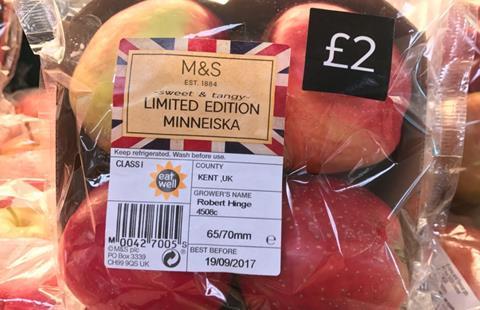
Increasing downward pressure on prices and a “culture of cheap food” is putting off fruit exporters to the UK because they believe the cost of supplying the market outweighs the possible returns; and while supplying markets elsewhere in the world, particularly in Asia, might not be as straightforward when it comes to logistics or market access, the potential rewards are proving significant enough to attract the attention of many of the UK’s traditional overseas suppliers.
That’s one of the stark conclusions drawn by Nuffield scholar James Smith in a new report entitled Realising the Potential of UK Apples and Pears, published this week with the support of the Worshipful Company of Fruiterers and The Food Chain.
“in the UK high standards are pre-requisite and returns are constantly low in comparison to other markets. It is no surprise then that the significance of the UK for fruit growers in the southern hemisphere is dwindling,” Smith wrote. “Some packers and exporters still focus on it with dedicated routes of supply to major retailers but in general much less fruit is sailing to northern Europe.”
For British apple and pear growers, meanwhile, their complete dependence on the UK market is holding them back and making them far less competitive than producers in other countries of the world, Smith concluded.
His report identifies a number of factors that are apparently holding back many of the UK’s fruit producers, for whom he said a higher degree of market focus was required.
While some companies have achieved much in terms of making their supply chains more efficient through vertical integration, scale and a tighter focus on the market through retailer partnerships, Smith observed that a large number of smaller growers were not in a position to do this themselves.
“Some are small enough to be nimble, close to their consumers and can make it work this way but many fall between the two: too big to be nimble and too small to benefit from scale in order to invest in the supply chain and to face retailers through direct supply models,” he said.
Global scope
Smith looked at markets, supply chains and production methods in several different countries – France, Holland, UK, Australia, New Zealand – to further his understanding of what currently limits the profitability of apple and pear production in the UK and to identify areas where it could be improved.
“The success of many other producing countries is driven by multiple markets and the ability to sell the whole crop,” he noted. “In the UK the industry struggles to export any meaningful volumes and thus relies entirely on the domestic market.”
UK retailers, he said, are “world leaders” in understanding their consumers and know precisely what drives sales of apples and pears. “Neat, convenient packs of fruit at a set price appear to sell best as the consumer knows what they are getting; waste levels are low and it is easy to manage promotional activity.”
For growers, supplying apples that are consistent as far as their shape, size or colour is concerned remains a major challenge.
“There’s no question that consumers thrive on convenience and like to know what they’re getting but, for the producer, selling by pack has its challenges as pack weight can vary resulting in varying price per kilo back to the farm,” he commented. “Understanding this is vital to the supply chain when negotiating prices.
Keep investing
Shielding retailers from volatility in the fresh produce supply chain is one of the best ways for growers and suppliers to increase the value of their products, Smith concluded.
Furthermore, fruit growers should Invest continuously to improve their production, look after soils, produce the healthiest food possible and stay ahead of the game as far as new varieties are concerned – whatever the prevailing market conditions.
At the same time, they should also strive to access new markets, deepen their understanding of the commercial landscape and develop strong relationships with others in the supply chain.



